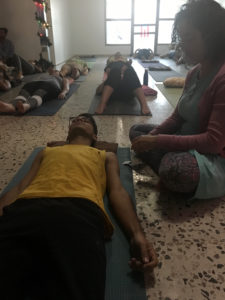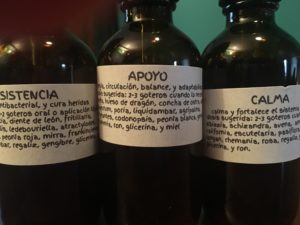María José Montijo is an ACTCM alum, singer-songwriter and harpist, and Puerto Rico native, who has been volunteering as an acupuncturist in Puerto Rico on and off since before Hurricane Maria. After the hurricane, María José stepped up her efforts through fundraising, as well as volunteering, and has visited the island a number of times to bring supplies and to help heal the people of Puerto Rico through acupuncture, medicine music, and community support.
José Montijo took a few minutes away from her clinical work in Oakland, CA to discuss the challenges of life in Puerto Rico after the hurricane, and to share her experiences volunteering at community clinics, healing workshops, and live music events with acupuncture throughout the island.

What was it like to volunteer as an acupuncturist in Puerto Rico?A lot of my volunteer acupuncture work in Puerto Rico has been at clinics run by the organization Salud y Acupunctura para el Pueblo (SAPP), which translates to Health and Acupuncture for the People. It was founded in 2015 by José Santini, an acupuncturist licensed in New York, who then moved back to Puerto Rico. He’s a visionary, who wanted to start a populist medicine movement by bringing acupuncture to people who couldn’t afford it. There’s a lineage of Puerto Ricans doing this: in the ‘70s, the Young Lords and the Black Panthers took over the Lincoln Hospital, creating the People’s Program, a community run detox support program and clinic with a focus on preventive medicine and education. These are the origins of the NADA protocol, used commonly for addiction and mental health issues, and are particularly useful in disaster zones.
Tell us about the SAPP clinics.
SAPP runs four weekly free acupuncture community clinics throughout the island, healing spaces accessible to underserved communities that stimulate empowerment, as well as mobilize towards social justice. There are also two weekly clinics at Centro de Apoyo Mutuo de Caguas (Mutual Aid Center), which is part of a volunteer-run, decentralized network that coordinates rapid response and long-term mutual aid in the aftermath of Hurricane Maria. Through the labor of love, grassroots organizers provided two to three meals a day to their communities, while addressing the particular needs of those whom they serve within an alternate economy model.
José Santini of SAPP started training laypeople at these centers and elsewhere on the island in the NADA protocol. The clinics also occasionally offer massage and essential oils; likewise a chiropractor or a reiki practitioner will sometimes be available.
The clinics are filled with everyday people – all classes, races, and ages. There is a real sense of camaraderie. We Puerto Ricans like to talk loudly and laugh, so while some people are in a meditative space, others are having lively conversations. These community clinics are focused on creating a space to heal—not a commodity, not something that you do by yourself and pay a lot of money to do, but rather something that’s accessible to everybody.

It sounds like community is playing a big role in the healing process in Puerto Rico.
Yes. After the hurricane, because of the lack of aid from FEMA, and local and federal governments, people started to organize—creating leadership and decentralization, and enabling greater autonomy, opportunity, and sovereignty in their communities. The practitioners at the clinics talk about how this coming together as a community really helps to strengthen people’s sense of self-worth, which is key to healing as a systematically oppressed and colonized people.
One of my favorite examples of the community coming together is the Centro de Apoyo Mutuo del barrio Las Carolinas en Caguas, which was opened by elderly women after the hurricane. They basically took over an abandoned school; they cut the chains to get in and cleaned it up, and made a community kitchen and started feeding people. They have programs specific to elderly people—for them to learn skills and make money, but also for building community. I went there with Bajacu Boricua to offer a meditation, movement and music workshop, and we were very impressed, because often at workshops, people are really timid. But at these workshops, everybody was introducing themselves and telling the story of how they came together. It was awe-inspiring.
What kinds of issues are you addressing with acupuncture at the clinics?
Chronic stress and chronic trauma are impacting the mental health of everyone on the island. I see this expressed in the clinics as a hypervigilance, a really heightened sympathetic state that never quits.
But it’s important to understand the depth of that stress. Since the hurricane, stress is just building and building and building. There hasn’t really been a resolution, because we didn’t get the support we needed, in terms of infrastructure, healthcare, and economic development. Everything, all the social securities in Puerto Rico, are crumbling, especially because of a disaster capitalism agenda and the federally appointed Fiscal Control Board’s (FCB) austerity measures. The FCB is operating not for the benefit of the people; rather it’s focused on the repayment of the debt, illegally incurred by corrupt government officials and bondholders.
And there’s a lot of uncertainty. People don’t know if they’re going to have a job tomorrow, or if they’re going to have access to healthcare or education. All these cuts are making more and more people migrate to get better opportunities, especially people that have higher education. So, there is a “brain drain,” and a lot of nurses and doctors are leaving, which means the clinics don’t have enough staff.
Even the police aren’t being paid enough, so they aren’t doing their job well. It’s really a state of chaos that is causing this chronic stress and trauma.

What is your approach to addressing such deep-rooted issues through acupuncture and Chinese medicine?
I focus on deactivating the sympathetic response and relaxing into a parasympathetic response. With ear acupuncture, you can use points that calm the vagus nerve, like Point 0. To relieve hyperalertness, I always use Yin Wei, Chong and Yin Qiao points. I like to do the opening points like P6, K6, and SP4; likewise, Si Shen Cong or Yin Tang and Du20. I love P6 and SP4 together to calm people down.
I always like to check in on people’s sleep and digestion; that’s very telling and informs what I do. If I support these two things, it’s really going to improve their mental health.
I also made three tincture formulas to bring with me: one was antiviral and antibacterial with a lot of clear heat toxin herbs; one was for PTSD, like a modified Gui Zhi Jia Mu Li Tang, with grounding herbs like du zhong and niu xi; and another from mostly Western herbs, that was for calming and sleep, with a lot of California poppy, skullcap, passionflower, oats and rose, but I also included shu di huang, he huan hua, long gan, gan cao, and wu wei zi.
It’s great to see the effects on the people. For example, there was this lady who was telling me how her blood sugar, blood pressure, and cholesterol have all stabilized since regularly visiting the SAPP clinic. She attributed it to the acupuncture, of course; but she also clearly benefited from being given a sense of community and purpose, because she took over managing the signup sheet for the clinic.
Do you see other modalities having a powerful effect on the healing process in Puerto Rico?
Massage, reiki, and aromatherapy are regularly given at the clinics. Personally, I am a singer-songwriter and harpist, and have used my music to both raise money for Puerto Rico and heal. I’ve done a healing musical tour of the island that combined live music shows with auricular acupuncture, and I’ve collaborated with Bajacu Boricua on community workshops that integrate music, meditation, and movement. We even had a clown from Columpio Colectivo—not everyone was into meditation, but everybody loved the clown!
I also enjoyed learning from Urayoana Trinidad, a licensed acupuncturist who was part of the Lincoln Hospital clinics. She came to teach SAPP workers about Daoism and Qigong. She correlated Daoism with the active process that Puerto Ricans have to undertake in healing the internal effects of colonialism, which results in a lack of self-worth and purpose, as well as feeling powerless over your destiny.
Thank you for your selfless efforts to enable healing in Puerto Rico.
If people reading this want to get involved, what would you recommend? If people want to volunteer as acupuncturists, they can Facebook message SAPP. It’s a visionary labor of love that they offer for free, so it’s a lot of work, and they do need volunteers to come and help out. Speaking Spanish is a plus. If you want to donate, SAPP is under the umbrella of the Integrative Health Project, so you can donate through their website; but be specific that it’s a donation for Salud y Acupunctura para el Pueblo.
How can people support political efforts to improve the situation in Puerto Rico?
If people want to be more informed, they can do so through the Center of Investigative Journalism. It’s also important to pressure government officials to support policies that will help build infrastructure in Puerto Rico. We really do have a political problem, and we do really need a change from a policy level. The more that people can become educated on what’s actually going on, and be vocal about what’s going on, I think that’s going to be really helpful. And just keep us on your radar.
Written by ACTCM Alum Dr. Stephanie Albert
Dr. Stephanie Albert holds a Doctorate of Acupuncture and Chinese Medicine from the American College of Traditional Chinese Medicine in San Francisco, CA. She runs a private practice out of the Lotus Center in the Mission district of San Francisco, where she works with patients to address stress, insomnia, pain, women’s health issues, and other health complaints through acupuncture, herbal medicine and lifestyle modification. www.stephalbert.com
About American College of Traditional Chinese Medicine
American College of Traditional Chinese Medicine (ACTCM) has provided affordable, quality health care to the public and trained professionals in acupuncture, massage and Chinese medicine since 1980. In addition to its graduate curriculum, ACTCM offers continuing education, public education, community outreach and clinical services in acupuncture and herbal medicine. ACTCM has been the recipient of many awards for its curriculum, faculty and clinic, and has been voted “Best of the Bay” by both the San Francisco Weekly and the San Francisco Bay Guardian. ACTCM is accredited by the Accreditation Commission for Acupuncture and Oriental Medicine and is a private, nonprofit, 501(c)(3) tax-exempt organization